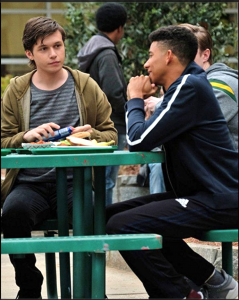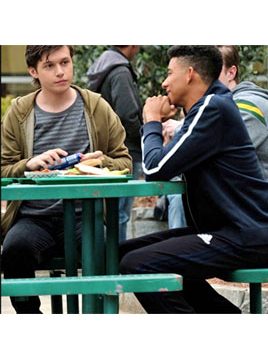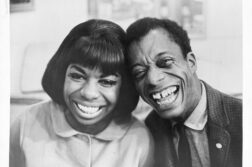Love, Simon
Directed by Greg Berlanti
20th Century Fox
TO UNDERSTAND the appeal of the sweet but spineless film, you first have to understand the mindset of the American millennial, the “screenager” who feels more at home behind a laptop than talking to someone face-to-face. This spring, at the university where I work in western Colorado, I collaborated with a colleague to teach a course about LGBT people in film. Sarah selected the films that were vital to her personal development as a gay woman and historian: The Watermelon Woman, Go Fish, and The Normal Heart. I rounded up the usual suspects—Rope, Milk, and Brokeback Mountain—and found, before too long, the course’s tone to be “depressing” (to use a common complaint lodged by our students whenever something fails to cheer or inspire).
The history of gay people on the silver screen, as we know from the pioneering work of Vito Russo and The Celluloid Closet, is far from inspiring. It’s full of dreary stereotypes: the killer queer, the sex predator, the bitchy best friend. In fact, a screening of Boys Don’t Cry elicited such anxiety and horror from our students that we decided to abridge it. College students today were raised on reality TV, but they often recoil when actual reality bares its ugly truths. Where, they wonder, is the log-out button?
This is one reason why Love, Simon appealed to many members of this generation. There is a glossy kind of goodness in all of the film’s characters, especially the teenage protagonist Simon Spier (played by newcomer Nick Robinson), who tells us in a voice-over: “I’m just like you except for one huge-ass secret.” Simon does not come close to any of the aforesaid stereotypes, and there is power in those three words—“just like you”—which build a bridge between straight and gay teens (the film’s target audience).

Based on Becky Albertalli’s young adult novel, Simon vs. the Homo Sapiens Agenda (2015), Love, Simon is set in the tony suburbs of Atlanta. Simon’s secret is that despite the fact that his earliest sexual fantasies involved Harry Potter’s Daniel Radcliffe—just a “phase,” he’d thought—he is not ready to come out to his family and friends. After he learns from his gal pal Leah that a classmate of his—who goes by the handle “Blue”—is posting about his own experiences as a closeted teen, Simon becomes an amateur detective. Dead-set on locating which of his classmates is posing as Blue, he flutters like a cyber-moth to the flame. In time, as he and Blue begin to strike up an increasingly intimate and confessional conversation, he finds himself falling head-over-heels for this mysterious classmate.
In the age of social media, Love, Simon asks what it means to be in the closet in the 2010s, when America’s late adolescents practically live online, posting away, creating various alter egos—“Jacques” in Simon’s case—to connect with one another. This is also a generation, reports show, that is having less sex than previous generations, which may explain—apart from the PG-13 rating—the curious prudery of Love, Simon. It’s more La La Land than Moonlight, and the imposing soundtrack makes it something of an extended music video interspersed with dialogue. Simon spends a lot of time staring into his laptop, which is possibly the most boring thing a film can show. More interesting is a fantasy montage premised upon the question “Why is straight the default?” that flips the script by showing teenagers having to come out as straight to their unsuspecting parents.
For a high school comedy that’s anything but a sex comedy—is a gay-themed American Pie the next step?—Love, Simon is even less sexy than you’d expect, especially considering that its subjects are teenagers. The film’s final scene, in which Simon finally connects with the true Blue, elicited an audible “Aww” from the rows of teenage girls in the audience when I saw the film, which culminates in a chaste kiss on a Ferris wheel, and all is well. The sets are straight out of a Nancy Meyers film, impossibly white and scrubbed of any sign of life—no grease, no dirty dishes. It’s a relief that there are characters of color in this modern fairy tale, even a classmate named Ethan who, being genderqueer, is bullied by his classmates but holds his head up high.
We have undoubtedly come a long way since 1955’s Rebel Without a Cause, with a gay high school kid nicknamed “Plato” who’s gunned down by police in the final reel. Yet Love, Simon is bland at times—lacking the wit and sophistication of last year’s Call Me By Your Name, for example. Simon’s loving mother (Jennifer Garner) waves a sign that reads “Down with Patriarchy!” while the closest his father (Josh Duhamel) comes to a homophobic slur is “fruity.” And, hey, what’s so bad about feeling good, especially in these grim and nerve-wracking times? Love, Simon is the fulfillment of one of my favorite lyrics by W. H. Auden, which opens with a sense of relief: “At last the secret is out, as it always must come in the end/ The delicious story is ripe to tell to the intimate friend;/ Over the tea-cups and into the square.” But to update the verse, replace “story” with Instagram feed, “intimate friend” with Snapchat friend, and “teacups” with an iced caramel macchiato (no foam).
Love, Simon is gleefully, even willfully, ignorant of literature and 2,000 years of homophobic persecution. Still, it exhorts its audience to “ride the bravery train and reveal our identities,” as the script by Isaac Aptaker and Elizabeth Berger pronounces. That’s valuable advice that even the toughest critic should take into account. Simon says.
Colin Carman, PhD, author of the forthcoming bookThe Radical Ecology of the Shelleys (Routledge), teaches at Colorado Mesa University.






